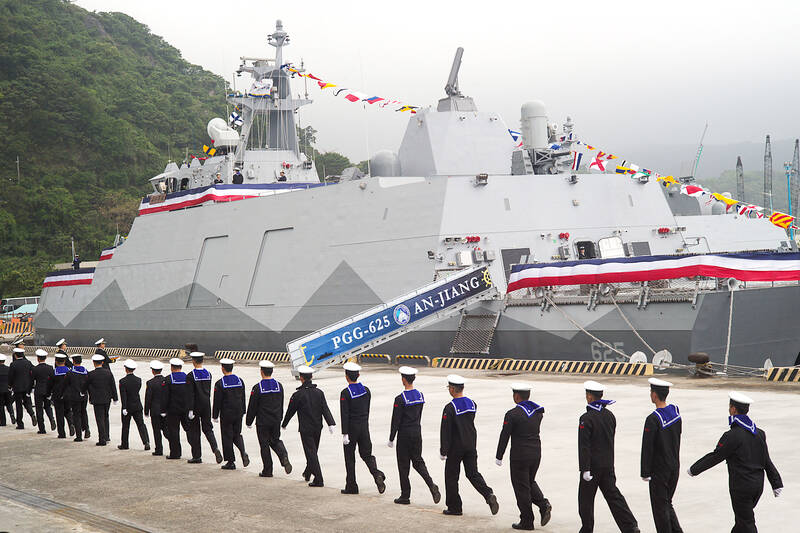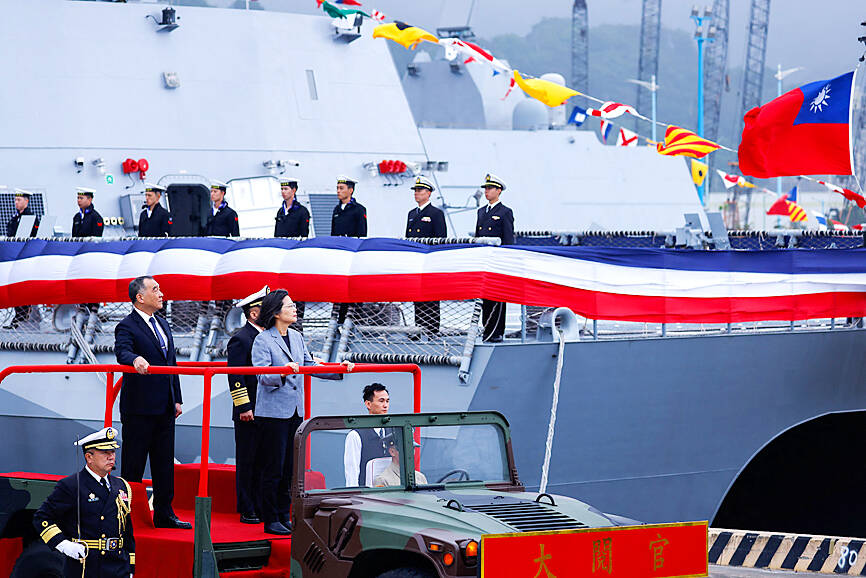President Tsai Ing-wen (蔡英文) yesterday presided over a ceremony at Yilan County’s Suao Harbor (蘇澳港), where the navy took delivery of two indigenous Tuo Chiang-class corvettes.
The corvettes, An Chiang (安江) and Wan Chiang (萬江), along with the introduction of the coast guard’s third and fourth 4,000-tonne cutters earlier this month, are a testament to Taiwan’s shipbuilding capability and signify the nation’s resolve to defend democracy and freedom, Tsai said.
The vessels are also the last two of six Tuo Chiang-class corvettes ordered from Lungteh Shipbuilding Co (龍德造船) by the navy, Tsai said.

Photo: Sam Yeh, AFP
The first Tuo Chiang-class vessel delivered was Ta Chiang (塔江) in 2021, with the vessel’s excellent performance earning international praise after it passed operational tests and evaluations, she said.
The wide recognition motivated the government to speed up corvette production, which allowed for the early delivery of the corvettes yesterday, she said.
The Tuo Chiang-class corvettes have stealth capability, improved stability and are the first small navy ships to be equipped with air defense missiles, she added.

Photo: Ann Wang, Reuters
The vessels also have more powerful performance than the outgoing Chin Chiang-class corvettes which they are to replace, Tsai said.
Su Tzu-yun (蘇紫雲), a research fellow at the Institute for National Defense and Security Research, said the Tuo Chiang-class corvettes, which some media outlets have described as “carrier killers,” are “small, but mighty.”
With a displacement of only 685 tonnes, the highly mobile corvettes can travel at 40 knots, Su said.
Their stealth capability means they have a radar cross-section as small as the size of a fishing boat, he said.
Crucially, they are equipped with layered weapons systems giving them formidable firepower, including TC- 2N air defense missiles, the Hsiung Feng II and Hsiung Feng III anti-ship missiles, and OTO Melara 76mm guns, he said.
The corvettes also have the Phalanx close-in weapons system, which can intercept missiles, as their final line of defense, he added.
The corvettes can be used in combination with land vehicle-mounted missile systems under the planned coastal combat command to guard offshore areas and prevent enemies from attempting landing operations, while submarines are deployed further from shore as a deterrence, thereby forming a multilayered barrier zone, Su said.
The navy plans to acquire five more Tuo Chiang-class corvettes, the contract for which was awarded to Lungteh in March last year.
Also yesterday, Taiwan tested its air defenses in early morning drills using surface-to-air missiles, and air, land and naval forces, saying it would continue to intensify training in the face of China’s frequent military activities nearby.
The Air Force Headquarters in a brief statement said that between 5am and 7am it carried out “overall air defense combat plan exercises” using domestic Sky Bow and US-made Patriot surface-to-air missiles in conjunction with aircraft and navy ships.
The drills were “to inspect and verify the joint air defense combat command and control of the three branches,” it said, adding that the outcome was “good.”
“In the face of Chinese aircraft and ships frequently encroaching into Taiwan’s surrounding sea and air space, the air force will continue to increase its training intensity to deal with potential threats,” the statement said.
Ministry of National Defense spokesman Sun Li-fang (孫立方) said that although there was no direct link between what he called routine annual drills such as these and current tensions, the threat from China is continuing to rise.
“Working out how to bolster our overall military capabilities is very important,” he told reporters.
Additional reporting by Reuters

Seventy percent of middle and elementary schools now conduct English classes entirely in English, the Ministry of Education said, as it encourages schools nationwide to adopt this practice Minister of Education (MOE) Cheng Ying-yao (鄭英耀) is scheduled to present a report on the government’s bilingual education policy to the Legislative Yuan’s Education and Culture Committee today. The report would outline strategies aimed at expanding access to education, reducing regional disparities and improving talent cultivation. Implementation of bilingual education policies has varied across local governments, occasionally drawing public criticism. For example, some schools have required teachers of non-English subjects to pass English proficiency

‘FORM OF PROTEST’: The German Institute Taipei said it was ‘shocked’ to see Nazi symbolism used in connection with political aims as it condemned the incident Sung Chien-liang (宋建樑), who led efforts to recall Democratic Progressive Party (DPP) Legislator Lee Kun-cheng (李坤城), was released on bail of NT$80,000 yesterday amid an outcry over a Nazi armband he wore to questioning the night before. Sung arrived at the New Taipei City District Prosecutors’ Office for questioning in a recall petition forgery case on Tuesday night wearing a red armband bearing a swastika, carrying a copy of Adolf Hitler’s Mein Kampf and giving a Nazi salute. Sung left the building at 1:15am without the armband and apparently covering the book with a coat. This is a serious international scandal and Chinese

TRADE: The premier pledged safeguards on ‘Made in Taiwan’ labeling, anti-dumping measures and stricter export controls to strengthen its position in trade talks Products labeled “made in Taiwan” must be genuinely made in Taiwan, Premier Cho Jung-tai (卓榮泰) said yesterday, vowing to enforce strict safeguards against “origin laundering” and initiate anti-dumping investigations to prevent China dumping its products in Taiwan. Cho made the remarks in a discussion session with representatives from industries in Kaohsiung. In response to the US government’s recent announcement of “reciprocal” tariffs on its trading partners, President William Lai (賴清德) and Cho last week began a series of consultations with industry leaders nationwide to gather feedback and address concerns. Taiwanese and US officials held a videoconference on Friday evening to discuss the

PERSONAL DATA: The implicated KMT members allegedly compiled their petitions by copying names from party lists without the consent of the people concerned Judicial authorities searched six locations yesterday and questioned six people, including one elderly Chinese Nationalist Party (KMT) member and five KMT Youth League associates, about alleged signature forgery and fraud relating to their recall efforts against two Democratic Progressive Party (DPP) legislators. After launching a probe into alleged signature forgery and related fraud in the KMT’s recall effort, prosecutors received a number of complaints, including about one petition that had 1,748 signatures of voters whose family members said they had already passed away, and also voters who said they did not approve the use of their name, Taipei Deputy Chief Prosecutor